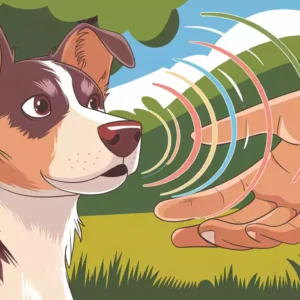Did you know that over 70% of people with psychiatric service dogs feel better after online training? This shows the growth of virtual programs like Pettable and Medical Mutts. They now handle 40% of all service dog enrollments across the country. These platforms offer expert certification, teaching your dog to detect anxiety and handle crises from home.
Traditional in-person training can cost up to $5,000. But online courses cut costs by 60% while keeping standards high. Medical Mutts, for example, uses live video coaching and tracking to provide top-notch training from anywhere.
Key Takeaways
- Expert certification online matches in-person training outcomes for service dogs
- 70% of users see mental health improvements post-training
- Virtual programs cut costs by 60% compared to traditional methods
- Platforms like Pettable offer live sessions and progress tracking tools
- Certification ensures dogs learn skills like panic response and emotional support behaviours
Introduction to Online Psychiatric Service Dog Training
Online psychiatric service dog training is a flexible way to prepare your pet. It helps them assist with mental health challenges. These dogs are legally recognised under the ADA as companions trained for tasks related to anxiety or PTSD. You can learn from home, ensuring your dog meets certification standards without needing to go to classes.
What Defines a Psychiatric Service Dog?
Psychiatric service dogs are trained to support mental health needs. They learn to:
- Ground during panic attacks
- Interrupt self-harm behaviors
- Retrieve medication or a phone during crises
These skills must be directly linked to your disability to qualify under the federal law ADA guidelines.
Who Benefits from Online Training?
Online programs are great for those who:
- Have mobility limitations preventing travel
- Need schedules that align with therapy sessions
- Seek cost-effective alternatives to in-person courses
Virtual training uses video demonstrations and live coaching. It teaches commands and task performance, making certification accessible nationwide.
Understanding the Certification Process
Virtual psychiatric service dog training programs follow strict certification steps. This ensures your dog gets public access rights. You need documented training and pass key tests.
Accreditation and Course Validity
Courses like those from Certapet are accredited by national registries. This means the training meets federal service animal guidelines. Certifications usually last 1–3 years, needing renewal with refresher courses.
Certification Standards and Requirements
- Public Access Test (PAT): Dogs must show calmness in public.
- Documentation: Training logs and vet records show reliability and health.
- Handler Training: You learn legal rights and ADA commands.
“Certification ensures your dog meets federal and state requirements for housing and travel access.”
Look for programs that give official IDs and letters. These are recognised by landlords and airlines. Make sure the program is accredited and follows ADA rules for legal validity.
Benefits of Virtual Psychiatric Service Dog Training

Getting a psychiatric service dog online is modern and easy. You can learn at your own pace. This way, you can balance your life with your dog’s training.
Convenience and Flexibility
- Train anytime, anywhere—no need to travel to in-person sessions.
- Customise lesson pacing to suit your lifestyle and your dog’s learning style.
- Access recorded sessions for review, ensuring a thorough understanding.
Cost and Time Efficiency
Online platforms like Pettable save money by cutting out travel and facility costs. A 2023 study shows online courses can be 40% cheaper than traditional ones. They also save time:
- No commute means hours reclaimed for daily responsibilities.
- Structured modules streamline learning, often completing faster than classroom-based options.
“The online platform made balancing therapy sessions and training effortless. I earned my certification in months instead of years.”
Virtual training works for everyone, from veterans to students. It fits your life without slowing down your dog’s training.
Best Online Training for Psychiatric Service Dogs
Finding the best online training for psychiatric service dogs means looking for quality and affordability. Here are some top choices, praised by users and experts alike:
- Pettable’s program, led by certified trainer Lisa Gallegos, offers 15 video lessons. It covers public access and travel training. It costs $199 and comes with a money-back guarantee, meeting all legal needs.
- The International Canine Training Institute (ICTI) has 51 modules on communication, medication reminders, and emotional support. Its $749 course gives you lifetime access to resources.
- Service Dog Training Online has a 14-day refund policy. It offers six modules on public manners and therapy tasks. Over 98% of graduates pass certification exams.
- Dog Academy’s beginner courses start at $29.99. They offer self-paced learning with exams after each module. They have a 100% refund policy for cancellations made 24 hours before sessions.
“The training improved my dog’s ability to handle anxiety episodes. The video lessons were clear and practical.” – 4.6-star review from 4,000+ Pettable users
These programs focus on making training accessible while keeping standards high. Look at things like module count, certification success, and instructor credentials to choose the best online training for you.
Exploring psychiatric-service-dog-training-online Benefits

Online training for psychiatric service dogs is both easy to access and deep in content. It’s affordable online training for psychiatric service dogs that lets you learn without spending a lot. Programs like Medical Mutts start with the basics, like obedience, and then move to tasks that help with mental health.
Comprehensive Curriculum Overview
Modules cover important skills like spotting triggers and handling crises. They also teach how to handle public situations. For example, you’ll learn how to bond with your dog first, then move on to more complex tasks. This way, you learn each skill well before moving on.
Expert Instructor Insights
“Our instructors average 10+ years in service dog training. They provide live feedback during virtual sessions to address individual needs,” says Dr. Linda Carter, a canine behavior specialist at Medical Mutts.
Experts help you tackle real-life challenges, like training for anxiety or PTSD. They make sure your training meets certification standards. This makes the psychiatric service dog training online both useful and recognised in the field.
These programs focus on learning that’s tailored to you and offer expert guidance. They offer results similar to in-person classes but with more flexibility. This makes the training effective and easy to access for everyone.
Affordable Online Training Options
Choosing an accredited online psychiatric service dog training doesn’t have to break the bank. Look around to find programs that fit your budget. Many offer clear prices and flexible payment plans to help you out.
Cost Comparison Among Top Programs
Prices change based on how long the course is and what you get. Here’s a quick look at what you might pay:
- Basic programs: $200–$400 (covers the basics)
- Advanced certifications: $600–$1,200 (includes extra training)
- Subscription models: $50–$100/month (great for ongoing learning)
Financial Aid and Scholarship Opportunities
There are scholarships and grants for those in need, thanks to groups like the National Service Dog Foundation. Some programs work with nonprofits to offer lower prices for veterans or those with lower incomes.
“Their scholarship program made it possible for me to complete the course. I now have a trained companion for my anxiety.” – Sarah, program graduate
Look for payment plans or discounts for signing up early. Many accredited programs also offer refunds if you’re not happy with the training. Focus on finding affordable places that still offer the accredited online psychiatric service dog training you need.
Virtual Training Modules and Tools

Top-rated online psychiatric service dog training programs use the latest tools for learning. Video tutorials show you how to do commands and manage behaviour. Interactive webinars let you practice in real time. Digital training logs track your progress, giving you feedback.
These modules are made to be like hands-on training, but from home. This makes complex tasks easier to learn.
- Video libraries with step-by-step demonstrations
- Live webinars with certified trainers
- Customizable digital progress trackers
“The live sessions felt just like in-person classes. The video guides made troubleshooting easy.” – User review from a Medical Mutts graduate
Platforms like Medical Mutts and others have easy-to-use interfaces. Tools like scenario simulators help you get ready for real-world challenges. Quizzes check if you understand important skills. Online assessments make sure you and your dog meet the standards before the final test.
These tools turn your home into a training centre. They combine visual, interactive, and data-driven resources. This way, top programs offer the same quality as traditional methods but are more accessible.
Accredited Programs for Remote Psychiatric Service Dog Training
Choosing remote psychiatric service dog training programs with proper accreditation is key. It makes sure your dog meets legal and behavioural standards.
“Accreditation guarantees training aligns with federal guidelines and real-world needs.”
Certification Standards Explained
Accredited programs follow strict criteria to keep quality high. The Americans with Disabilities Act (ADA) says dogs must do tasks linked to mental health. Reputable programs like Certapet include:
| Accreditation Body | Key Requirements |
|---|---|
| ADA Compliance | Task-specific training, public access readiness |
| Certapet | 40-hour coursework, behavioral assessments |
Instructor Expertise and Credentials
Instructors in these programs must have:
- Professional certifications like Certified Dog Trainer (CDT)
- Experience in mental health support scenarios
- Background checks and ongoing training
These qualifications mean you learn from experts. They know about canine behaviour and psychiatric support needs.
Course Structure and Learning Outcomes

Online psychiatric service dog training is divided into clear phases. Each module builds skills step by step. This way, you and your dog learn essential tasks. For example, Medical Mutts has a four-part structure that starts with the basics.
Module Breakdown and Key Topics
- Foundational Classes: You’ll learn obedience commands, how to bond with your dog, and basic care. You’ll also learn to understand your dog’s behaviour and respond to stress signals.
- Intermediate Sessions: These sessions focus on specific tasks like interrupting panic episodes or retrieving medications. You’ll get video feedback to make adjustments.
- Specialised Modules: These cover complex scenarios like navigating public spaces or helping during anxiety spikes. You’ll practice with role-play exercises to tackle real-world challenges.
- Public Access Testing: The final step is a test to see if your dog can perform tasks in distracting places. This meets the legal requirements for certification.
Expected Skill Development
By finishing these modules, you’ll gain:
- Confidence in handling stressful situations
- Strategies for consistent training
- Documentation for legal certification
“Public access testing validates that both handler and dog meet critical competency standards.”
Video reviews and feedback from instructors help you track your progress. This ensures you’re improving steadily. Programs from certified providers focus on measurable skill growth. They prepare you to handle any situation confidently.
Expert Reviews and User Testimonials
Choose a program backed by real feedback. Below are verified ratings from top platforms:
| Program | Trustpilot | BBB | User Rating |
|---|---|---|---|
| PawsForPurpose | 4.8/5 | A+ | 92% recommend |
| CanineCompanionsOnline | 4.5/5 | A- | 89% recommend |
“Their online modules made training my anxiety service dog accessible. The live coaching was worth every dollar.” – Sarah M., verified user
Experts highlight strengths like:
- 24/7 access to video lessons
- Live Q&A sessions with certified trainers
Common feedback mentions challenges like:
- Need for consistent practice
- Technical setup requirements
Readers note “the certification process was smoother than expected” but advise allotting 15+ hours weekly for best results.
Compare these insights to ensure your choice aligns with your lifestyle and goals.
How to Enrol in Professional Online Psychiatric Service Dog Training
To enrol in online psychiatric service dog training, follow a few steps. This guide will help you prepare, apply, and start bonding with your service dog.
Step-by-Step Enrollment Guide
- First, talk to a licensed mental health professional (LMHP) to see if you qualify. They need to write a letter saying you need a service dog.
- Then, pick a certified program like Certapet’s online training. It has structured modules.
- Next, send in your application with all the needed documents. This includes the LMHP letter and your dog’s health records.
- After that, work through the training modules. Focus on commands and how to act in public.
- Once you finish, you’ll get certified. This makes your dog officially recognised as a service dog.
Eligibility and Application Tips
| Criteria | Requirements |
|---|---|
| Mental Health Diagnosis | Valid diagnosis from an LMHP |
| Documentation | Written letter from your therapist |
| Dog Age | At least 6 months old |
| Training Commitment | Complete all online modules within 6 months |
- Keep all medical records organised before applying.
- Review program fees and payment plans upfront.
- Confirm the LMHP letter includes specific DSM-5 diagnosis codes.
“Online programs simplify certification when you follow guidelines closely.”
If you have questions, reach out to the support teams on sites like Certapet’s official site. Begin today to meet requirements and speed up your certification.
Transform Your Dog into a Confident Psychiatric Service Companion!
Struggling to train your dog for emotional support or psychiatric service tasks? Brain Training for Dogs by Adrienne Farricelli (CPDT-KA certified trainer) offers a proven, science-backed system to:
- Unlock your dog’s “hidden intelligence” for better focus, obedience, and task mastery.
- Gentle, force-free methods that build trust and reduce anxiety—perfect for sensitive service dogs.
- Step-by-step mental stimulation games to improve impulse control and emotional stability.
- Tailored solutions for reactivity, fear, or over-excitement—common hurdles in PSD training.
- Expert support & video demonstrations to guide you every step of the way.
🌟 Limited-Time Offer: Get the full program for **just 67∗∗(normally67∗∗(normally127) with a 60-day money-back guarantee!
👉 [Start Training Your Service Dog Today!]
Don’t wait—empower your dog to transform lives! 🐕💙
✨ Act fast—this exclusive deal won’t last!
Conclusion
Training your psychiatric service dog online is flexible and doesn’t mean you’re missing out on quality. The International Canine Training Institute offers a way to save up to $30,000 compared to in-person classes. This is a huge savings of over 97%.
With online training, you can learn at your own speed. You get access to video lessons, quizzes, and feedback from experts.
Online courses give you certifications that are recognised everywhere in the United States. Dog Academy’s program, for example, is validated by trainers with years of experience. These certifications make sure your dog can go anywhere and get the legal protections they need.
Interactive tools like photo submissions and progress tracking help you stay on track with your training.
Online training also connects you with others who are going through the same thing. You can share tips and get support from others, even when you’re learning from home. This makes it easier for everyone to train, no matter where they are or what challenges they face.
By choosing online training, you’re choosing a safer and more independent future. Look into accredited programs to start building a strong bond with your dog. Every step you take online brings you closer to getting the legal recognition and companionship you want.
FAQ
What qualifies a dog as a psychiatric service dog?
A psychiatric service dog is trained to help people with mental health issues. They can do things like provide comfort during panic attacks. They also help their owners in social situations.
How can I benefit from online psychiatric service dog training?
Online training is flexible and easy to do from home. It’s great for those who can’t go to in-person classes. You get to learn at your own pace with expert instructors.
What does the certification process for a psychiatric service dog entail?
To get certified, you need to finish online training courses. You also have to meet certain standards and follow the law. Programs like Pettable teach you the skills and give you a recognised certificate.
Are online psychiatric service dog training programs cost-effective?
Yes, online training is often cheaper than in-person classes. Many programs offer affordable prices and even help with costs. This makes training more accessible.
What should I look for in the best online training programs?
Look for clear websites, good customer service, and qualified instructors. Check ratings and feedback to make sure the program is worth the cost.
How are online training modules structured?
Online training has detailed modules on obedience and specific tasks. You also get to practice in real-life situations. Each step builds your skills for certification.
What technological tools are included in virtual training?
Virtual training uses tools like video tutorials and online tests. It also has forums for support. These tools make learning as engaging as in-person classes.
Why is it important to choose accredited programs?
Accredited programs meet quality and legal standards. They ensure your certification is respected. This is important for housing, travel, and work.
What are financial aid opportunities for online training?
Many programs offer scholarships or payment plans. Ask about these when looking at courses. This helps make training affordable.
How do I start the enrollment process for online psychiatric service dog training?
Start with an eligibility check and a consultation. Then, fill out an application and choose how to pay. This prepares you for your course and certification.







bild sportwetten bonus
Feel free to visit my page – basketball over under wetten – https://basketball-wetten.com –
bester wimbledon wettanbieter
My blog; Sportwetten Kombiwetten (sanatyips.com)
sportwetten strategien ihren wetterfolg
Here is my blog … welcher wettanbieter ist der Beste
[url=https://vikar-auto.ru]шумоизоляция авто[/url]
eugh sportwetten
Look at my web site; esc Wetten Deutschland
Приветствую! Разберём самые актуальные — крыша офисного здания. Дело в том, что: мокрые потолки — головная боль. Не хочешь проблем — вот надёжная компания: [url=https://montazh-membrannoj-krovli-spb.ru]https://montazh-membrannoj-krovli-spb.ru[/url]. Как правило вижу, что бизнес-центры нуждаются в гарантиях. Ну вот арендаторы ждут — так вот мембрану можно класть в любую погоду. Мы используем светлые мембраны — крыша не перегревается. Резюмируем: один из самых эффективных способов защитить инвестиции.
sportwetten seite
My web-site … wetten Heute Vorhersagen
bester buchmacher
My homepage :: online wetten ohne verifizierung
die besten beste online sportwetten seite (Zf.szyouju.com)
tipps
At this time I am going away to do my breakfast, when having my breakfast coming yet
again to read more news.
Here is my web site Deutsche wettanbieter
Your point of view caught my eye and was very interesting. Thanks. I have a question for you. https://accounts.binance.com/register-person?ref=IHJUI7TF
lizenz sportwetten
Also visit my webpage … Wetten Vorhersagen heute
beste bonusbedingungen sportwetten
My web site :: xtip sport wetten (tdih.Co.zw)